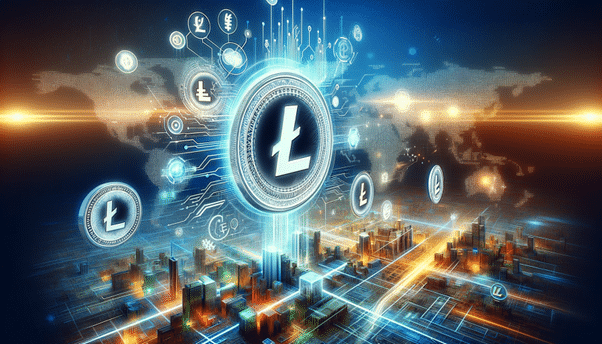Table of Contents
Cryptocurrencies have rapidly evolved from a niche interest to a cornerstone of the digital economy. Among these, Litecoin (LTC) has emerged as a popular choice for both users and businesses. This blog post delves into the world of Litecoin, highlighting who and where you can accept litecoin, its integration into various industries, and the challenges and future prospects of LTC as a payment method.
Litecoin, often referred to as the silver to Bitcoin’s gold, has gained significant traction as a preferred ltc payment method. Its growing popularity can be attributed to various factors, from transaction speed to lower fees, making it an attractive option for users and businesses alike.
Importance of Cryptocurrency Acceptance in Today’s Digital Economy
- Increased Digital Transactions. The digital economy is increasingly embracing cryptocurrencies. In 2023, Litecoin has seen a surge in acceptance, reflecting a broader shift towards digital currencies.
- Decentralization and Efficiency. Cryptocurrencies offer decentralized, fast, and secure transactions, appealing to the tech-savvy and privacy-conscious consumer.
- Global Reach. Digital currencies transcend geographical boundaries, making them ideal for global commerce.
What is Litecoin?
Litecoin is a digital cryptocurrency, created in 2011 by Charlie Lee, a former Google engineer. Often referred to as the ‘silver to Bitcoin’s gold’, Litecoin was designed to be a lighter version of Bitcoin.
Litecoin, like other cryptocurrencies, operates on a blockchain, which is a public ledger of all transactions in the network. This blockchain is maintained by miners who validate and record transactions, earning Litecoin as a reward for their efforts.
As a payment method, Litecoin has been adopted by various merchants and is often praised for its efficiency and relatively low costs. It’s considered one of the major cryptocurrencies and is commonly used for transferring funds between individuals or paying for goods and services where it’s accepted.
Litecoin vs. Bitcoin: Understanding the Difference
| Feature | Bitcoin (BTC) | Litecoin (LTC) |
| Creation Date | 2009 | 2011 |
| Creator | Satoshi Nakamoto | Charlie Lee |
| Block Generation Time | Approximately 10 minutes | Approximately 2.5 minutes |
| Maximum Supply | 21 million coins | 84 million coins |
| Hashing Algorithm | SHA-256 | Scrypt |
| Transaction Fees | Typically higher | Generally lower |
| Purpose/Goal | Digital gold, store of value | Faster transactions, ‘silver’ to Bitcoin |
| Mining Process | Requires more powerful hardware (ASICs) | Initially more accessible to individual miners with standard computers |
| Market Position | The first and largest cryptocurrency | Among the top cryptocurrencies, known for its speed and efficiency |
| Adoption and Use Cases | Widely accepted, more as a store of value | Increasingly accepted, especially for smaller and more frequent transactions |
| Scalability | Challenges due to block size and time | Faster processing offers better scalability for transactions |
Acceptance of Litecoin in Various Industries
E-Commerce and Retail
Overstock.com: An early adopter of cryptocurrency payments, Overstock accepts Litecoin, facilitating a seamless shopping experience.
Newegg: This tech-focused retailer allows customers to pay with Litecoin for a variety of electronic goods.
Travela: A travel booking platform where users can pay with Litecoin for flights, hotels, and rental services.
Food and Beverage Industry
Lieferando.de: A major online food delivery service in Germany, accepting Litecoin as a payment method.
CryptoCoffee: An innovative platform where coffee enthusiasts can purchase their favorite blends using Litecoin.
Technology and Software Services
Microsoft: Users can use Litecoin to buy digital content on the Microsoft Store.
Namecheap: A leading domain registration and hosting service accepting Litecoin payments.
Charities and Non-Profit Organizations
The Water Project: A non-profit organization that accepts Litecoin donations to fund clean water projects in Sub-Saharan Africa.
Save the Children: This global charity accepts Litecoin, among other cryptocurrencies, for donations.
Travel and Hospitality
Travala.com: A popular online travel agency where users can book hotels, flights, and holidays with Litecoin.
How These Platforms Integrate Litecoin Payments
Payment Gateways: Many companies use litecoin payment gateways such as CryptoProcessing by CoinsPaid, BitPay and Coinbase to process payments.
Litecoin Merchant Processors: These processors facilitate the conversion of Litecoin to fiat currency, mitigating the risk of volatility.
Simplicity and Efficiency: The integration of Litecoin payment providers simplifies transactions, offering a hassle-free experience for both businesses and customers.
Challenges and Limitations
Some businesses face challenges integrating Litecoin with their existing payment systems.
As Litecoin’s popularity grows, scalability issues may arise, affecting transaction speeds and costs.
The volatile nature of cryptocurrencies can affect the value of transactions, posing a risk for businesses.
Businesses must develop strategies to manage the risks associated with accepting cryptocurrencies.
The legal framework for cryptocurrencies is still evolving, leading to uncertainty for businesses.
Businesses must navigate a complex web of regulations to legally accept Litecoin.
Conclusion
Litecoin’s journey in the digital economy is a testament to the evolving landscape of digital currencies. Its increasing acceptance across diverse sectors highlights its potential as a viable payment option. As the digital world continues to embrace cryptocurrencies, Litecoin stands out as a forerunner, paving the way for a more inclusive and efficient digital economy.


